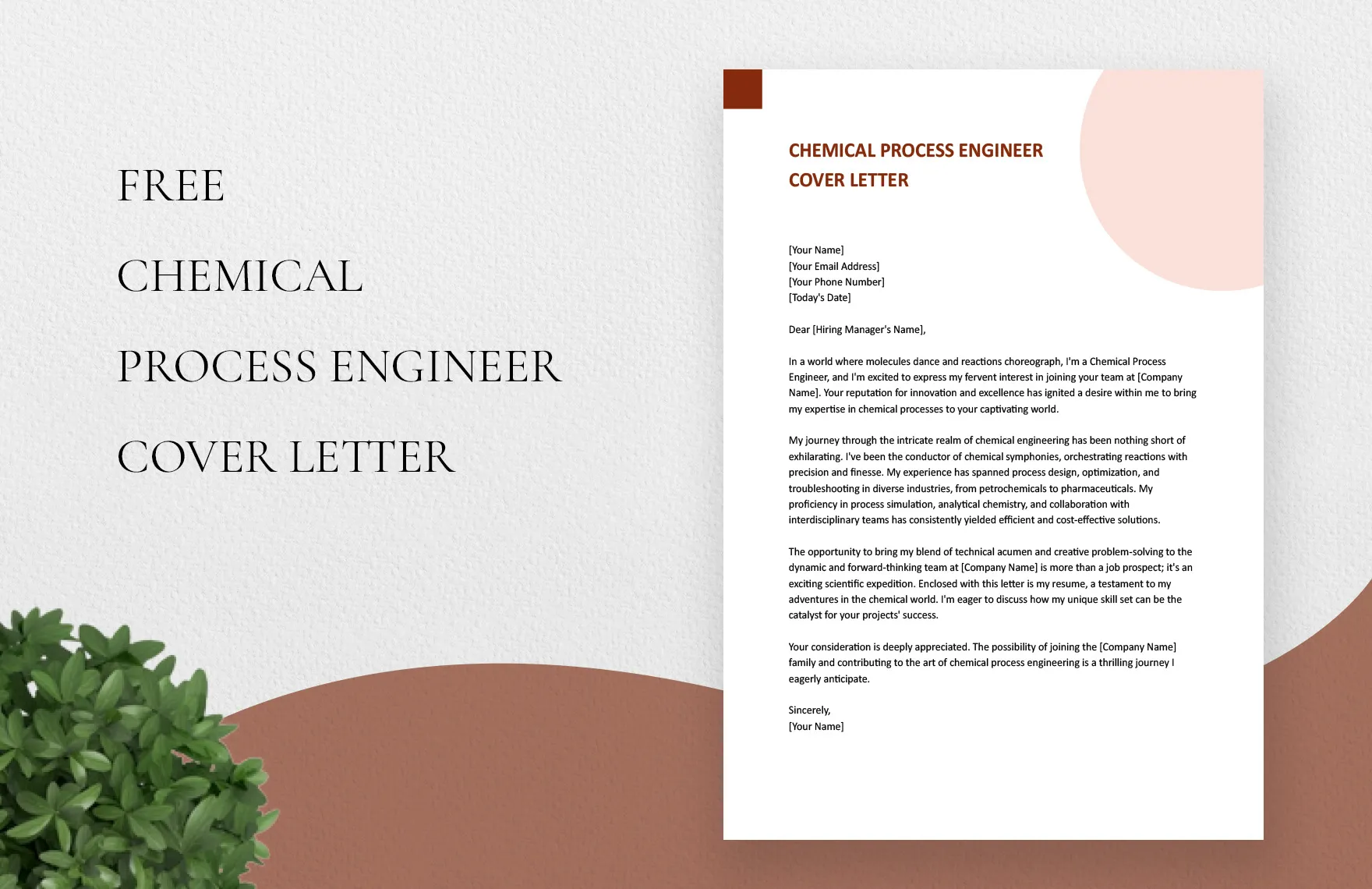Cover Letter for Chemical Engineers
A cover letter is a crucial element of any job application, especially for chemical engineers. It serves as your first introduction to a potential employer, allowing you to showcase your skills, experience, and enthusiasm for the role. A well-crafted cover letter can significantly increase your chances of landing an interview. This article provides five essential tips to help chemical engineers create a compelling cover letter that grabs the attention of hiring managers and highlights their qualifications effectively. By following these guidelines, you can create a cover letter that not only presents your technical abilities but also demonstrates your personality and passion for the field, giving you a competitive edge in the job market. Remember, the goal is to make a strong first impression and convince the employer that you are the perfect fit for the position.
Highlighting Your Skills
In a cover letter, it’s important to showcase the skills most relevant to the job. Chemical engineering is a diverse field, and employers seek candidates with specific skills. Start by carefully reviewing the job description to identify the key requirements. Then, highlight your proficiency in those areas, such as process design, modeling and simulation, or project management. Instead of just listing skills, provide brief examples of how you’ve applied them. For instance, you could mention a project where you successfully optimized a chemical process, highlighting your problem-solving abilities and attention to detail. Moreover, mentioning specific software you are proficient in, like Aspen Plus or MATLAB, adds significant value. Always tailor your skill highlights to match the job’s demands, ensuring your letter resonates with the hiring manager and demonstrates your suitability for the role.
Quantifying Your Achievements
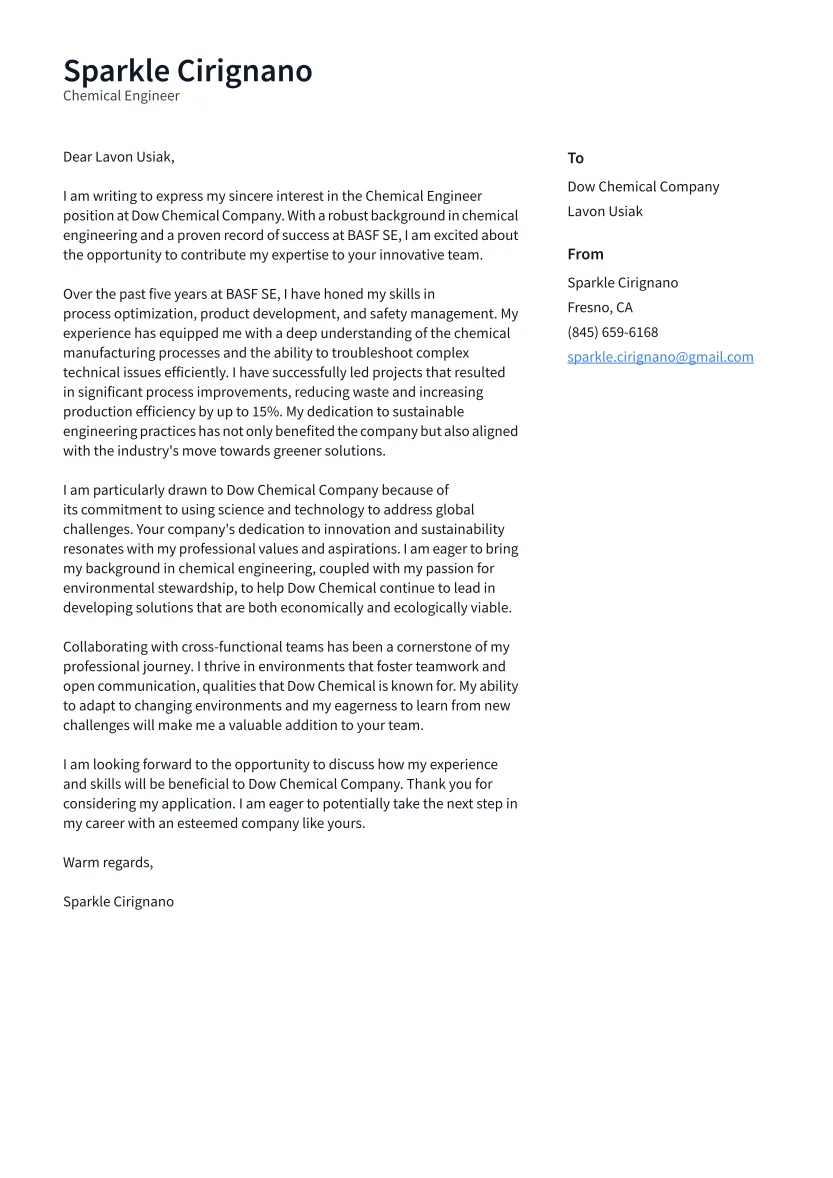
One of the most effective ways to make your cover letter stand out is by quantifying your achievements. Rather than simply stating what you’ve done, provide concrete numbers and results to illustrate your impact. For example, if you improved a process, mention the percentage increase in efficiency or the amount of cost savings achieved. If you led a project, specify the budget and the timelines, and highlight any milestones reached. When describing your accomplishments, use action verbs to create a dynamic and engaging narrative. Words like “developed,” “optimized,” and “implemented” are powerful tools. Quantifying your achievements not only demonstrates your abilities but also provides tangible evidence of your contributions, making your application more compelling and memorable for the employer. This approach shows that you are results-oriented and capable of delivering value.
Tailoring to the Job Description
Every job is unique, and your cover letter should reflect that. A generic cover letter is unlikely to impress a hiring manager. Take the time to carefully read the job description and tailor your letter to match its requirements. Highlight the skills and experiences that align with the specific needs of the role. Use keywords from the job description throughout your letter, but do so naturally, not as a list. This approach shows that you have taken the time to understand the position and that you are genuinely interested in the opportunity. Customizing your cover letter demonstrates your attention to detail and your commitment to the application process. Tailoring your cover letter not only increases your chances of getting noticed but also demonstrates your proactive approach to the job search and your dedication to the prospective employer.
Keywords and Formatting
Proper formatting and strategic use of keywords are essential for an effective cover letter. Use a clear and professional font, and ensure your letter is easy to read. Break up large blocks of text with short paragraphs and bullet points where appropriate. In terms of keywords, carefully review the job description and integrate relevant terms naturally into your writing. This helps applicant tracking systems (ATS) identify your application, and it also shows the hiring manager that you understand the role’s requirements. Avoid keyword stuffing, which can make your letter sound unnatural and less effective. A well-formatted cover letter with strategic keywords enhances readability and demonstrates your attention to detail, making it easier for recruiters and hiring managers to assess your qualifications and skills. Ensure the formatting is consistent and professional throughout.
Demonstrating Enthusiasm
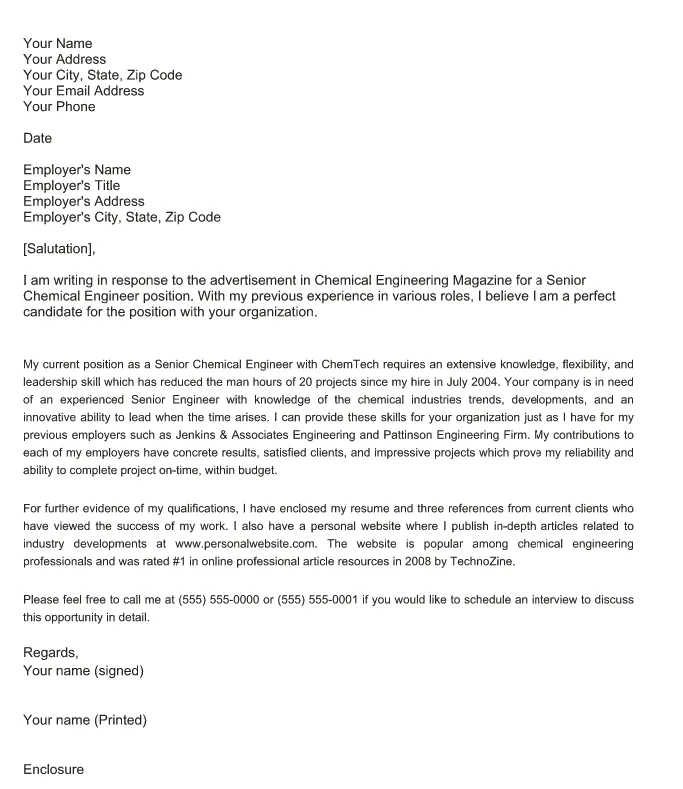
A cover letter is a chance to express your genuine interest in the position and the company. Show your enthusiasm by explaining why you’re excited about the opportunity. Research the company and mention specific projects or initiatives that appeal to you. Highlight how your skills and experience align with the company’s goals. Demonstrate your passion for chemical engineering and explain what motivates you in this field. Your enthusiasm can set you apart from other candidates. A cover letter that showcases enthusiasm and a genuine interest in the role demonstrates initiative and a proactive approach. It indicates that you are not just looking for any job, but that you are specifically interested in the organization and its mission. This will help your cover letter stand out.
Showcasing your Passion for Chemical Engineering
Demonstrate your passion for chemical engineering by discussing your specific interests within the field. Mention projects that you have particularly enjoyed, or areas of research that excite you. Share how your values align with the company’s mission or values. This allows the hiring manager to connect with you on a personal level. Demonstrating a passion for the industry helps in making a more persuasive and memorable cover letter. Showing your unique contributions is the best way to stand out. Employers want to hire candidates who are genuinely enthusiastic about their work, as they are more likely to be engaged, motivated, and committed to the company’s success. Moreover, explaining why you’re drawn to this particular role helps the hiring manager understand your career goals and motivations.
Proofreading and Editing
Before submitting your cover letter, carefully proofread it for any errors in grammar, spelling, and punctuation. A mistake-free cover letter shows that you pay attention to detail and that you care about making a good impression. Consider having a friend or career counselor review your letter as well, as a fresh pair of eyes can often catch errors you might have missed. Proofreading is a crucial step in the cover letter writing process, as errors can undermine your credibility and detract from your qualifications. Taking the time to ensure your letter is polished and professional demonstrates your commitment to excellence and enhances your chances of success. Even minor mistakes can make a negative impression, so it’s better to be thorough. Proofreading ensures that the main message of your cover letter is clear and effective.
Ensuring Clarity and Accuracy
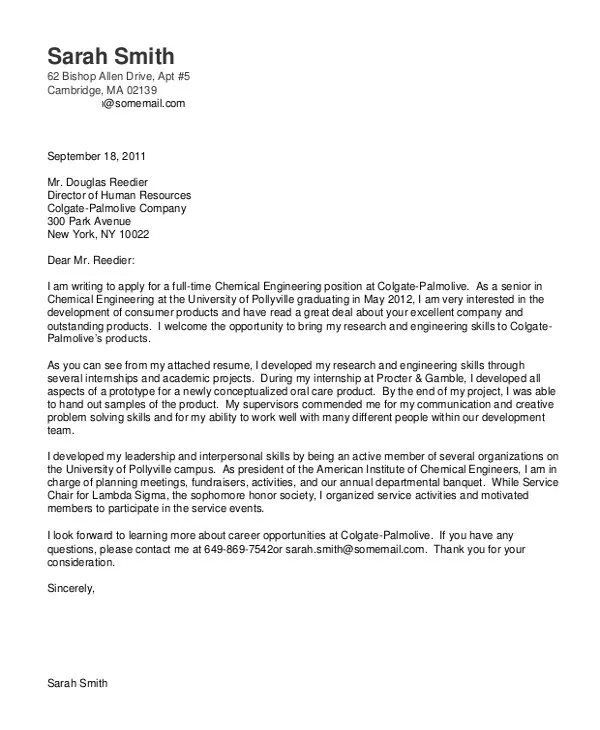
Clarity and accuracy are vital components of a successful cover letter. Use straightforward language and avoid jargon that the hiring manager might not understand. Make sure your sentences are clear and concise. Provide accurate information about your skills, experience, and accomplishments. Being clear and precise in your cover letter helps you communicate your qualifications effectively and presents you as a detail-oriented individual. Clarity ensures that the hiring manager understands your key attributes. Additionally, double-check all the facts and figures you include in your letter. This helps you avoid making a mistake that could reflect poorly on your abilities. A cover letter that is both clear and accurate conveys professionalism and increases the likelihood of getting an interview.
Contact Information and Follow-up
Ensure your cover letter includes your contact information, such as your email address and phone number. Make it easy for the hiring manager to reach you. Following up after submitting your application is a good practice. Send a brief email a week or two after submitting your application, expressing your continued interest and reiterating your qualifications. This shows initiative and demonstrates your genuine interest in the position. It can also provide an opportunity to address any questions the hiring manager might have. Contact information in the header of your cover letter provides an easy way for the employer to reach out. Your phone and email are the most common way to provide this information. Following up is a professional gesture that can set you apart from other applicants. It shows that you are proactive and serious about getting the job.
Providing Clear Contact Details
Always provide up-to-date and accurate contact information. Include your full name, phone number, email address, and a link to your LinkedIn profile, if you have one. Ensure that your email address is professional and that you regularly check it for communications from potential employers. It is essential to make it easy for the hiring manager to contact you. Incorrect or outdated information can lead to missed opportunities. Make sure all the details are correct and easy to find. Including a link to your LinkedIn profile gives the employer a quick way to learn more about you and your professional background. By providing comprehensive contact information, you ensure that you are accessible and ready to take the next step in the hiring process.
Following Up After Submission
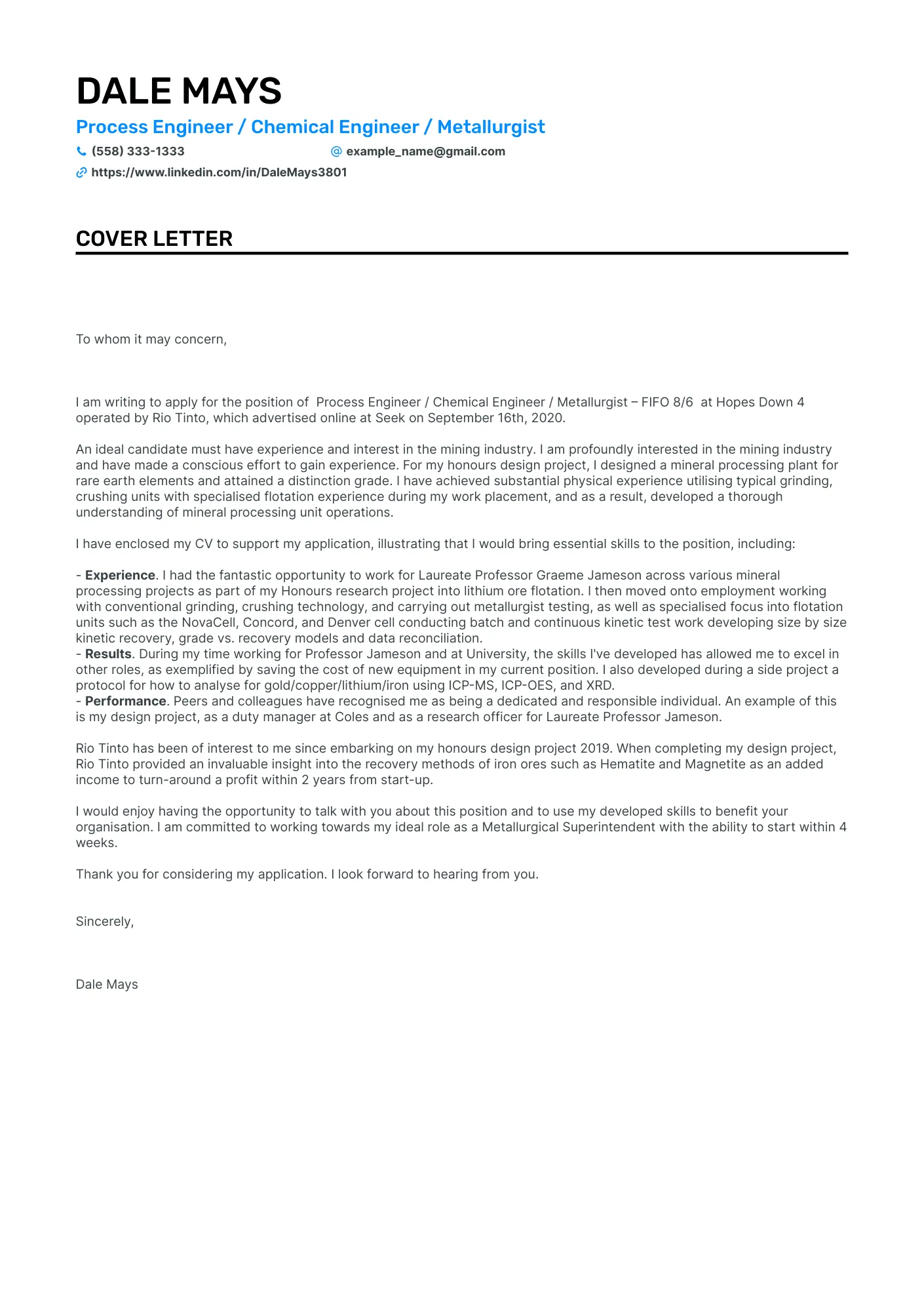
Following up after submitting your cover letter is a good way to reiterate your interest in the role and to stay at the forefront of the hiring manager’s mind. Send a brief email a week or two after submitting your application, expressing your continued interest in the position and thanking the hiring manager for their time. Restate your key qualifications and mention anything new that might have happened since you submitted your application. This demonstrates your enthusiasm and initiative. If you have any relevant updates or new information, you can include it in your follow-up email. However, keep the message concise and professional. Following up allows you to stay engaged with the hiring process. It also shows your commitment to the opportunity and can help you stand out.
In conclusion, a well-crafted cover letter is essential for chemical engineers seeking employment. By highlighting your skills, quantifying your achievements, tailoring your letter to each job description, demonstrating enthusiasm, and proofreading carefully, you can create a compelling cover letter that captures the attention of hiring managers. Following these five tips will significantly increase your chances of landing an interview and ultimately securing your desired chemical engineering role. Remember, your cover letter is a chance to showcase your expertise and passion for the field, so make it count.
